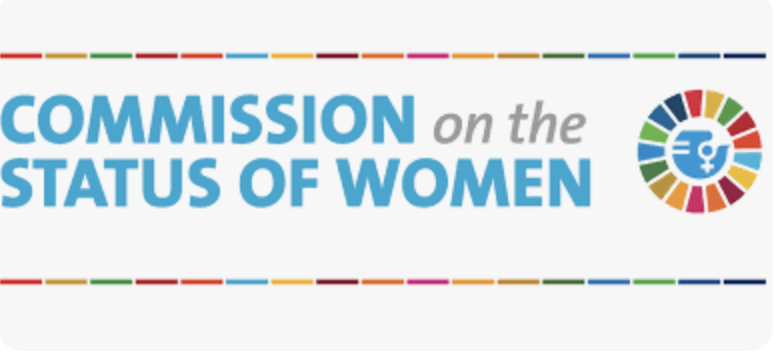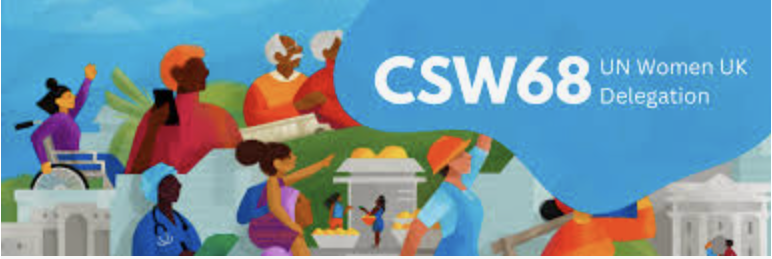Accelerating Gender Equality: Insights from a Delegate for UK UNWomen at CSW68
The United Nations Commission on the Status of Women (CSW) is a pivotal arena for fostering gender equality and women’s empowerment on a global scale. I had the privilege of attending this year as one of the delegates for UN Women UK. CSW68 has provided profound insights into the challenges and opportunities in this crucial endeavour. Reflecting on the discussions, alongside statistics shared at the conference, illuminates the urgency of our collective action to address gender disparities comprehensively.
1. Economic Empowerment: Breaking Barriers for Women
At CSW68, statistics highlighted the persistent gender gaps in economic participation. Globally, women earn approximately 77 cents for every dollar earned by men, with women of colour facing even wider disparities. Moreover, women remain underrepresented in leadership positions, comprising only 27% of managerial roles worldwide. These figures underscore the imperative of dismantling systemic barriers to women’s economic empowerment, including unequal pay, limited access to finance and entrepreneurship opportunities, and discriminatory labour practices.
In their Guide to CSW-63, Women shares, “Despite the clear need for investing in gender equality, financial investment in women remains alarmingly low. Data from 48 development economies shows that an additional $360 billion is needed per year to achieve gender equality and women’s empowerment.”

2. Education: A Cornerstone for Gender Equality
Education emerged as a linchpin for advancing gender equality, as evidenced by statistics shared at CSW68. Despite progress, 132 million girls worldwide are still out of school, perpetuating cycles of poverty and marginalization. Furthermore, disparities persist in STEM (Science, Technology, Engineering, and Mathematics) education, with women comprising only 35% of STEM students globally. Closing the gender gap in education requires concerted efforts to eliminate barriers such as gender-based violence, early marriage, and inadequate infrastructure, ensuring all girls have equal access to quality education.
3. Violence Against Women: A Global Epidemic
The sobering statistics on violence against women presented at CSW68 underscored its pervasive nature and profound impact on women’s lives. Globally, 1 in 3 women experiences physical or sexual violence, with rates even higher in conflict-affected regions. Additionally, the COVID-19 pandemic exacerbated gender-based violence, with lockdown measures trapping many women in unsafe environments. Addressing this epidemic demands comprehensive strategies, including legal reforms, survivor-centred support services, and community-based prevention initiatives, to eradicate violence in all its forms.
4. Political Participation: Bridging the Gender Gap
Political participation remains an area where gender disparities persist, as highlighted by statistics shared at CSW68. Women represent only 25% of national parliamentarians worldwide, with progress towards gender parity in political leadership slow and uneven. Furthermore, women continue to face numerous barriers, including gender-based discrimination, harassment, and lack of access to resources and networks. Achieving gender equality in political representation requires transformative measures, including legislative quotas, targeted capacity-building programs, and cultural shifts to challenge stereotypes and biases.

5. Health and Well-being: Ensuring Comprehensive Access
Statistics on women’s health presented at CSW68 underscored the importance of ensuring comprehensive access to healthcare services. Globally, 810 women die every day from preventable causes related to pregnancy and childbirth, with significant disparities in maternal mortality rates between high-income and low-income countries. Additionally, access to sexual and reproductive health services remains limited for many women and girls, exacerbating gender inequalities and hindering progress towards gender equality. Strengthening health systems, promoting gender-responsive healthcare policies, and addressing socio-cultural barriers are essential steps towards achieving optimal health outcomes for all women.
The statistics shared at CSW68 underscore the urgency of accelerating efforts to achieve gender equality comprehensively. From economic empowerment to education, violence prevention, political participation, and healthcare access, addressing gender disparities requires multifaceted approaches and sustained stakeholder commitment. As we navigate the path forward, let us harness the insights from CSW68 to drive meaningful progress towards a more equitable and inclusive world for all.
If you enjoyed this, you might like to check out our recent article “Empowering Women Leaders: Key Insights for Optimising Success” or visit our YouTube Channel.

